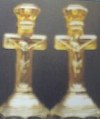Carnival Glass 101 | home Quick Reference to Carnival Glass Patterns
Westmoreland
WESTMORELAND CARNIVAL GLASS
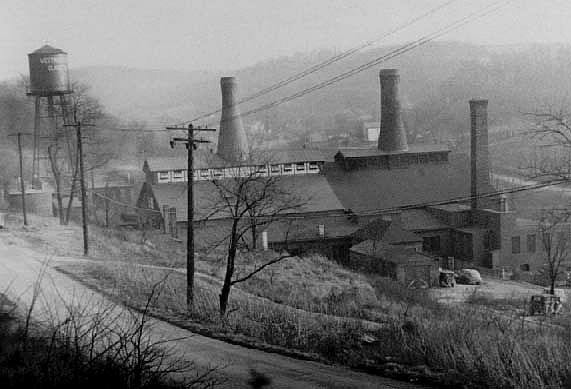
Factory located in Grapeville, PA~~Pittsburgh area. They operated from 1889-1984.
As compared to the Big Five manufacturers of carnival glass, Westmoreland made few entries into the vintage arena. However, the selection of patterns, and certainly the use of their particular base glass, created some of the most interesting results to be collected by admirers. Since milk glass, opalized glass, and opaque colored glass, (through which the outline of one's finger can be seen-referred to in carnival glass circles as Moonstone), was included in their basic line of wares, it follows that some of that type base glass was used in their presentation of iridized patterns. Many of the Westmoreland pieces are poorly iridized; (the spray not applied entirely over the surface). Patience and search will reward with a nice example, however!
In the book by Charles West Wilson, called Westmoreland Glass, the author states that very few stemmed pieces were made by this company. Three of four compotes shown in a Butler Brothers Catalog advertisement of a nine-piece assortment have six-pointed pressed stars on the bottom, including the Leaf Swirl compote. Six long and six short leaf fronds on the exterior only are twisted to give a “swirl” effect.
A partial quote on color from the Wilson book follows: “In 1898 Westmoreland, along with much of the glassware industry, made a green glass that is often found decorated with gold luster. Sometime before 1905, however, Westmoreland apparently discontinued that color. Westmoreland opalescent blue appears indistinguishable from the opalescent blues made by Northwood, Fenton, and perhaps others at the time. Westmoreland chose not to offer their medium blue and green colors. Instead, Westmoreland split the difference and came up with a blue-green or turquoise color.
It was unusual, and it was precisely this color that glassmakers were trying to get away from because it resembled glass (pickle jars) made with iron impurities in the sand. To my knowledge, it was used around 1910 only by Westmoreland, used for only a few years, and used only for their iridised pieces. Westmoreland's iridised glass in this color often shows a particular depth and vitality.”
There seems to be no reference to yellow-based iridised glass in this book. Westmoreland glass has distinctive features by which it can be identified. This draws interest by collectors.
We refer to old, or vintage carnival glass as those items produced prior to 1925, generally speaking.
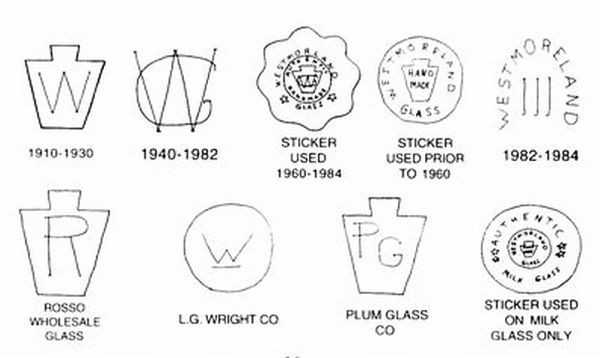
Westmoreland Trademarks
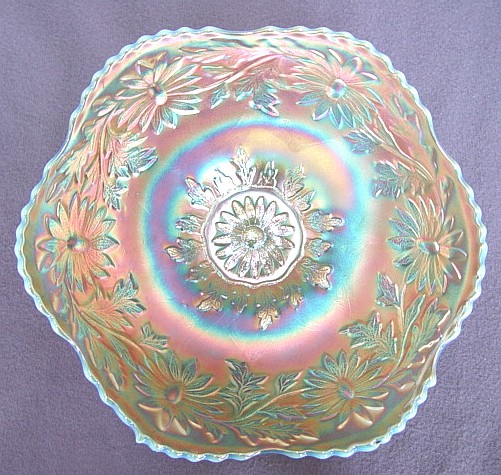
One of two known-Blue Opal DAISY WREATH plates.
DAISY WREATH: The definitive central flower, along with the circle of daisies around the outer edge, leave little to imagination when naming this pattern. One mold was used to create 9” bowls, the couple of known plates, and a vase in this pattern. Most bowls are ruffled, but ice cream shaped examples are known. Blue opal is the dominant color, followed by marigold over milk glass (MMG), and peach opal.
Marigold is a rare color for this pattern.
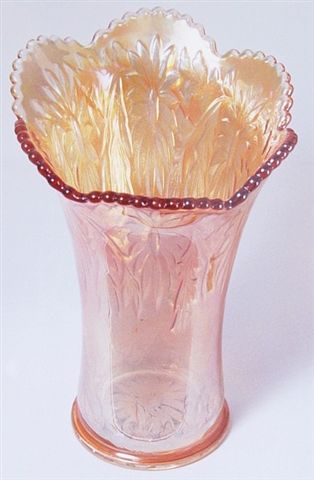
Marigold DAISY WREATH vase-swung from the bowl shape.
DAISY WREATH VASE: The single known vase in this pattern last sold in 1999 for more than $1700. A blue opal plate could be expected to sell for several hundred dollars at auction.
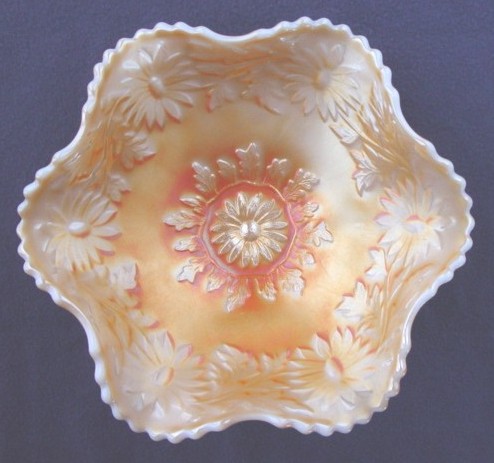
Moonstone DAISY WREATH
DAISY WREATH: A lovely bowl having marigold over moonstone base in Daisy Wreath pattern sold privately for $375. in 2003.
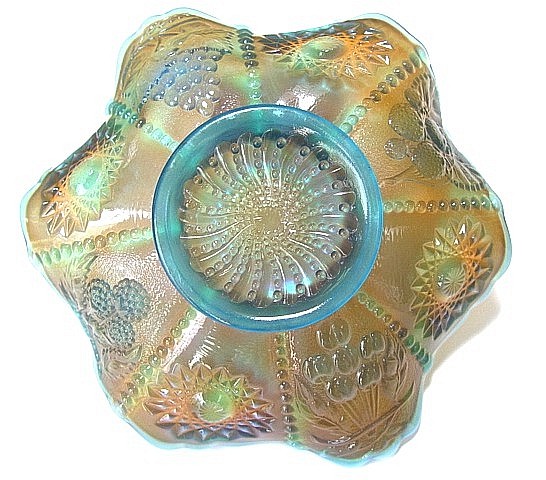
Blue Opal -Exterior-HOBSTAR & FRUIT
HOBSTAR and FRUIT: is a rather “unconventional” and extremely interesting pattern. Alternately appearing in panels, are the hobstars, cherries, grapes, strawberries, and possibly blackberries in clusters. Such diversity of design for an exterior on this 5 to 5 ½” piece, along with the fact that it was produced in only this one size, creates desirability. A delicate feature are the dainty hobs, both in the outer pattern, as well as within the marie, where a beautiful swirl design, along with more hobs create a “whirling” effect, if you will. Ruffled bowls and banana shaped bowls in blue opal, marigold, marigold over milk glass and peach opal are known. Blue opal has been reported in a 10” bowl in this pattern. Blue opal and MMG prices for either shape can reach into the $400 range for nicely iridized examples.
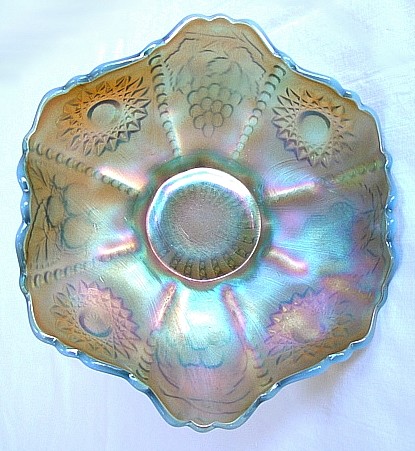
Interior of HOBSTAR & FRUIT-blue opal
HOBSTAR & FRUIT~~INTERIOR: Although beautifully iridized, the exterior design shows through to the interior, indicating a delicate piece of glass. Overall, we must conclude that this is an unusually endowed design, having detail not found on many small items.
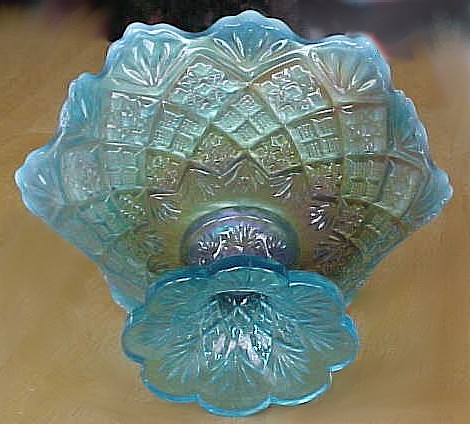
FILE & FAN Compote in Blue opal
FILE and FAN: Here again we have an exterior pattern found on this small 6” compote. The iridescence is found only on the interior of the bowl. A blue opal example which had been flattened into a cake plate sold in 2000 for more than $200. Other colors are marigold, mmg, and peach opal.
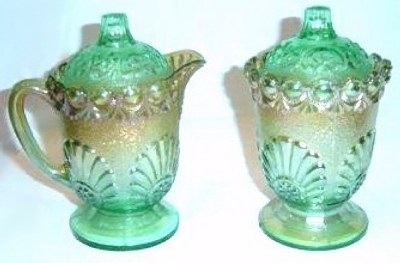
SHELL & JEWELS LIDDED CREAMER & SUGAR
SHELL and JEWELS: Part of the early Westmoreland line called Victor, a footed creamer and sugar with lids are the only examples which have been found iridized. For some reason, the lids are never iridized. Aqua, green, purple and marigold are the known colors. The Marigold examples are seen more infrequently than green.
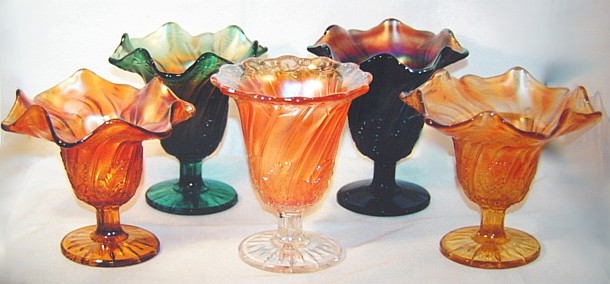
Wonderfully different shapes of LEAF SWIRL
LEAF SWIRL: Again, we have an exterior pattern, with the iridization appearing on the interior of this 6 ½” compote, which can be found openly ruffled or left more upright. Amber, Aqua/teal, marigold and yellow-amber complete the spectrum of colors found in this compote. None of them are easily found. The photo is one used by Ruth Herrington to illustrate a fine article she wrote on this subject matter, for the San Diego Carnival Glass Club Newsletter in Sept. 2001.
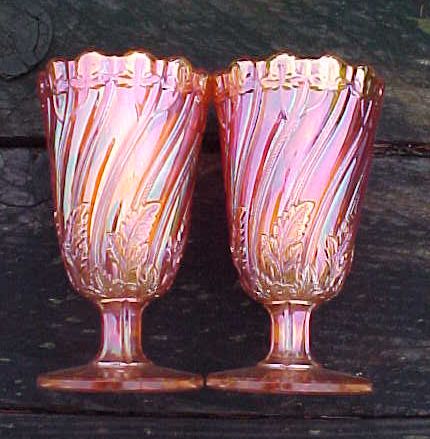
Leaf Swirl matched set of vases measuring 6 1/2 inches tall. Base glass color is yellow amber.
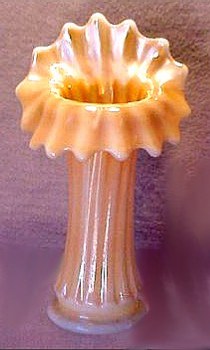 |
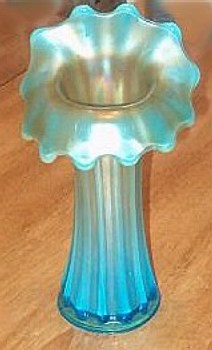 |
Marigold over Moonstone JIP Vase
|
Blue Opal JIP Vase
|
CORINTH jack-in-the-pulpit vase-marigold over moonstone. Base diameter is 3 ¼”. Although many vases have vertical ribs, this is the only one having 12 ribs. Straight vases can be found in amber, amethyst, aqua/teal, blue opal, green, marigold over moonstone ,teal, olive and marigold (rare).
CORINTH jack-in-the-pulpit vase- blue opal. This shape vase can be found in amber, yellow-amber, amethyst, blue opal, green, marigold (rare), marigold over moonstone and teal.
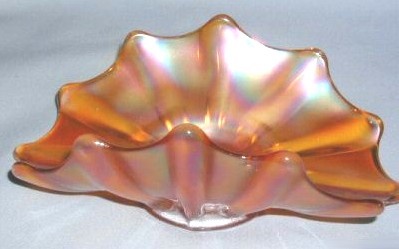
CORINTH Banana Dish
CORINTH BANANA DISH: The same mold used for vases was occasionally flattened or flared into a ruffled bowl and shaped into a banana dish (2 sides up). Amber, amethyst, marigold and teal are known in this banana shape.
Dean & Diane Fry~~ 12/04




In this world's misery there is only one sure refuge: God Himself.
“He is a shield to all who trust in Him.” (Psalm 18:30)




back to Carnival Glass 101
Should you care to contact the Frys, their email address is:
Search Carnival Glass 101
Our other sites you may enjoy:
Everything you EVER wanted to know about Indiana Glass
Great Reference for Newer Carnival Glass.
Complete Glassware Catalogs Available to Download
Questions? Comments? Suggestions? Broken Links? Corrections?
Your Friendly Webmaster is here to help!
